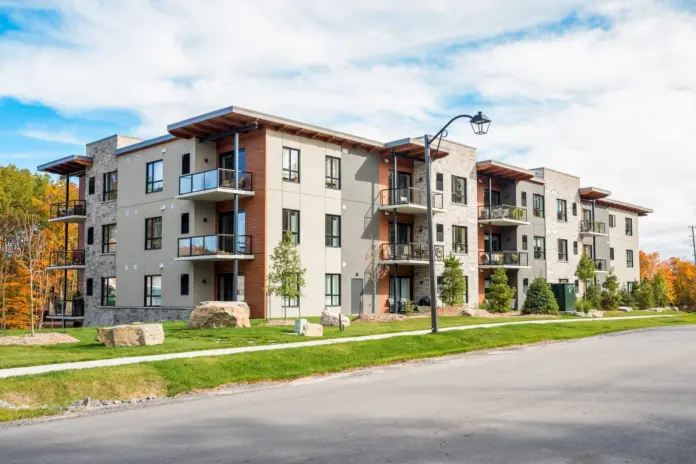Condo vs. Apartment: Key Differences & Which One is Right for You? – The largest distinction between a condo and an apartment is ownership. An apartment is legally described as a home that is rented, and usually part of a larger residential complex. A condo may be structurally the same as an apartment typically a unit in a larger residential complex but condos are owned rather than rented. The owner pays the property taxes on a condo; landlords, not tenants, pay property taxes on an apartment.
Since condo and apartment communities are structured similarly, they tend to have similar amenities and locations. Both types of units may include perks such as a pool, trash removal, manicured green areas, on-property gyms, and more.
A condo owner, though, is investing in equity, paying monthly homeowners association (HOA) fees, and is in charge of all interior upkeep. An apartment tenant, by contrast, pays a monthly rent, does not build equity,y and is at the mercy of the landlord when maintenance is necessary.
When choosing where to reside, it’s essential to know the distinctions between condos and apartments. While they may appear similar at first sight, the rental experience of condos and apartments is quite different. In this blog, we talk about the most significant differences between them, from maintenance responsibilities, amenities, and costs to rules and regulations involving both. At the end of it, you’ll have a better idea of which one may be the most suitable for you.
Also read: How Much Does It Cost to Rewire a House? A Complete Guide
Learning the Basics: Condo vs. Apartment
The first step in deciding whether to go for a condo or an apartment is to know the basics of the two. Condos are typically individually owned units in a larger residential building or complex. In this setup, a condo owner can become a landlord and lease out his or her unit. This means that when you lease a condo, you are leasing from the owner directly, and the owner may have his or her own set of rules and restrictions.
Apartment buildings, on the other hand, are owned by one organization or property management company. In this case, all apartments are rented out to tenants, and all tenants share similar responsibilities for rent payment and following rental agreements. This distinction can make a difference in your life a lot.
Maintenance Responsibilities: Who Does What?
Maintenance is a large part of any rental setting, and the needs can be greatly different in condos than in apartments. With a condo, the homeowners association (HOA) usually maintains the common areas, such as hallways, pools, and landscaping. However, individual condo owners are responsible for the fix within their units. What that implies is if something is not right within your leased condo, you would be required to ask the owner to repair it.
However, when leasing an apartment, the management corporation takes care of all repairs and maintenance within the building and in the units themselves. This may provide renters with a sense of security that problems will be attended to by the management team without having to get in touch with a private owner.
Amenities and Fees: The Way It Ought to Be
Amenities can be quite different among apartments and condos, and these play a substantial role in overall quality of life. Both houses typically share some amenities such as parking, laundries, and common rooms. Condos, however, have more tailored features such as unique decor, hardwood floors, and newer fixtures, since single owners have control over how units are presented.
As for pricing, you’d expect condos to always be more expensive due to the model of ownership. However, price isn’t determined by the model of ownership, but by a myriad of factors such as location and features available. Yes, living in a condo will have you pay homeowners association fees, but that doesn’t necessarily equate to it costing more than an apartment. Both options are generally going to require a security deposit and may have first and last month’s rent plus moving fees.
One of the major differences is that apartments will charge background checks more frequently with extra fees. Apartment buildings may also ask tenants to pay extra for utilities like gas, electricity, and internet, or condo owners may package them into one bill every month.
Rules and Regulations:
Rules and regulations can play a major role in your living life, and they are quite different in condos and apartments. The homeowners association creates rules known as covenants, conditions, and restrictions (CC&Rs) in a condo. These rules may contain things such as trash pickup, exterior decorations, and required quiet hours. Additionally, individual condo owners may have their own rules for their condos, which makes the living life of various condos quite different from each other.
On the other hand, apartment complexes have standardized rules that are the same for every unit. These types of rules will usually cover issues like whether or not residents can drill holes in the walls, paint their apartments, or have overnight visitors. Knowing these rules exist before you make your decision will allow you to decide which living situation is most suitable for your lifestyle.
Condo vs. Apartment: Which is Right for You?
So how do you decide between leasing a condo or an apartment? It depends on what you’re looking for and how you like to live. If you like the owner-to-consumer connection and the individuality that’s present in a condo, then that might be more your preference. If you do enjoy having upkeep handled by a property management staff and prefer to have fixed rules on each unit, then an apartment would be more suitable.
Remembering the location, amenities, cost, and laws will make your choice an intelligent one. Both apartments and condos have unique benefits, and knowing the distinctions between them will guide you to the best investment for your way of life.








